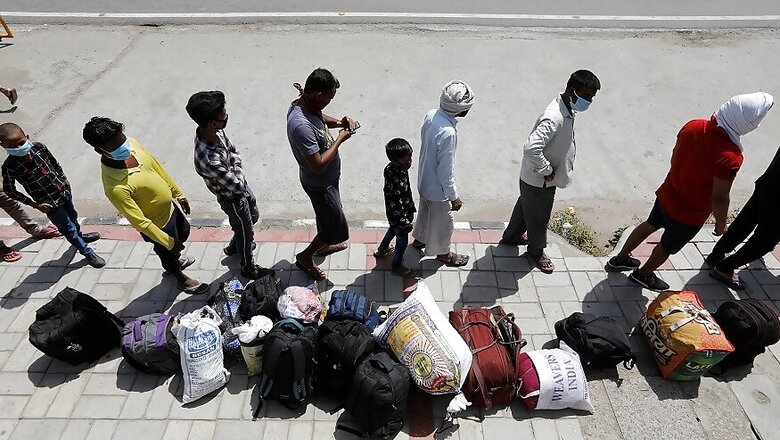
views
After innumerable stories of their plight and agony, the Supreme Court on Tuesday decided to finally look at the problems being faced by migrant workers left stranded in different parts of the country due to the coronavirus-induced lockdown.
The top court admitted that "crises of migrant labourers is even continuing today with large sections still stranded on roads, highways, railway stations and state borders", requiring effective concerted efforts to improve the situation.
A bench headed by Justice Ashok Bhushan took suo motu cognisance of the issues relating to migrant workers and sought a response from Solicitor General Tushar Mehta.
Fixing the matter for hearing on Thursday, the bench recorded in its order that "there have been inadequacies and certain lapses" although the Centre and states have maintained they were taking all necessary steps.
"We are of the view that effective concentrated efforts are required to redeem the situation," said the bench, which also included Justices Sanjay K Kaul and MR Shah.
The bench asked the law officer to assist it and bring to the notice of the Court all measures and steps taken by the Government of India and to be taken in this regard. It also issued notices to all the states and union territories, seeking their responses at the earliest.
In its order, the bench referred to newspaper reports and media reports that have been "continuously showing the unfortunate and miserable conditions of migrant labourers walking on-foot and cycles from long distances".
"They have also been complaining of not being provided food and water by the administration at places where they were stranded or in the way i.e. highways from which they proceeded on-foot, cycles or other modes of transport," it said.
The bench was ostensibly referring to the incident wherein a 16-year-old girl rode 1,300 kilometress on a bicycle, with her father as pillion, from Haryana's Gurugram to Bihar's Darbhanga.
The court emphasised the present situation of lockdown in the entire country and said this section of the society needs succour and help by the concerned governments, especially steps need to be taken by the government of India, state governments or union territories in this difficult situation to extend helping hand to these migrant labourers.
The Supreme Court order has come more than a month after the problems being faced by migrant workers came to light. Not only this, when a few petitions relating to migrant workers were taken up by the apex court earlier, it expressed satisfaction at the steps being taken by the central government and did not seem it to be a "crises" -- used today in the suo motu order.




















Comments
0 comment